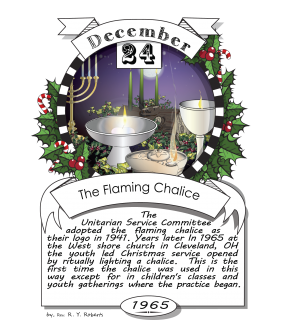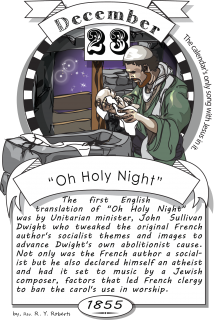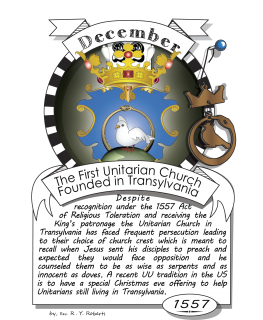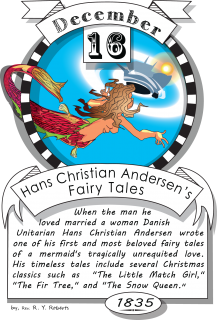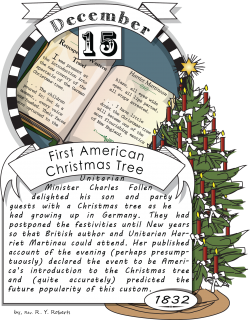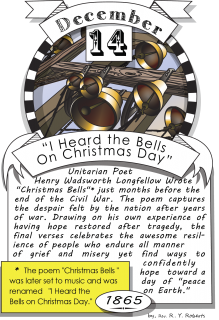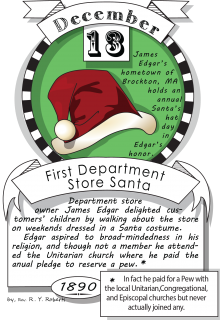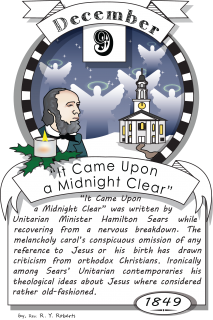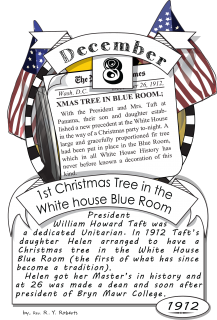Usually December 22.
Aisha's Moonlit Walk
By Anika Stafford
A fictional modern-day family celebrates eight pagan holidays over the course of a year.
Winter solstice is the shortest day and the longest night of the year. Traditionally, it is a time of both foreboding and expectancy, as the longest night leads to the return of the sun. “Solstice” in Latin means “the sun standing still.”
The Winter Solstice has become important to both humanists and pagans, who can find common ground in celebrating this occasion. Themes can include light amid darkness; the death of nature and the cycle of life; the darkness just before the dawn; the miracle of every birth.
Faith Without Borders
For everything there is a season—a time to die and a time to be born. With the arrival of winter’s low dark sky, communities around the world look to the miracle of light as a sign of rebirth and a source of hope. We celebrate the promise of new life and recommit ourselves to the protection of everyone’s right to his or her own radiant humanity.
Celebrating the winter holidays is an excellent opportunity for Unitarian Universalist congregations to express their commitment to our Sixth Principle: We covenant to affirm and promote the goal of world community with peace, liberty and justice for all. See Sixth Principle Resources for winter holidays.
From Tapestry of Faith Curricula
Unitarian Universalist Perspectives
Toggle to filter resultsAvailable filters:
Changing a filter will refresh results (and remaining options) immediately. Searching by keyword or changing the number of items per page requires use of the "Search" button.
Displaying 1 - 13 of 13
-
December seventh, "Eight Candles" (1970). Malvina Reynolds was a 20th century Jewish, Unitarian Universalist, socialist, songwriter, and performer who is best known for her song “Little Boxes.” In 1970 she recorded the Hanukkah Song “Eight Candles.” It has since become a holiday favorite.Image | By Ralph Yeager Roberts | December 11, 2022 | From WorshipWebTagged as: Advent, America, Christmas Eve / Christmas, History, Winter, Winter Solstice / Yule
-
December twenty-fourth, The Flaming Chalice (1965). The Unitarian Service Committee adopted the flaming chalice as their logo in 1941. Years later, in 1965, at the West Shore Church in Cleveland, OH the youth led a Christmas service opened by ritually lighting a chalice....Image | By Ralph Yeager Roberts | November 23, 2015 | From WorshipWebTagged as: Advent, Christmas Eve / Christmas, History, Identity, Unitarian Universalism, Unitarianism, Universalism, Winter Solstice / Yule
-
December twenty-third, “O Holy Night” (1855). The first English translation of "O Holy Night" was by Unitarian minister John Sullivan Dwight, who tweaked the original French author's socialist themes and images to advance Dwight's own abolitionist cause. Not only was the French author a...Image | By Ralph Yeager Roberts | November 23, 2015 | From WorshipWebTagged as: Advent, America, Arts & Music, Christmas Eve / Christmas, History, International, Unitarianism, Winter, Winter Solstice / Yule
-
December twenty-second, The First Unitarian Church Founded in Transylvania (1557). Despite recognition under the 1557 Act of Religious Toleration and receiving the king's patronage, the Unitarian church in Transylvania has faced frequent persecution....Image | By Ralph Yeager Roberts | November 23, 2015 | From WorshipWebTagged as: Advent, Christmas Eve / Christmas, History, International, Unitarianism, Winter Solstice / Yule
-
December twentieth, first of Elliot’s Ariel Poems, “The Journey of the Magi” (1927). "Magi" is Unitarian T. S. Eliot’s first of 5 Christmas poems published after his ambivalent choice to join the Anglican church. Many believe that Eliot's feelings about his new church are reflected by the...Image | By Ralph Yeager Roberts | November 23, 2015 | From WorshipWebTagged as: Advent, America, Arts & Music, Christmas Eve / Christmas, History, Prophetic Words & Deeds, Unitarian Universalism, Winter, Winter Solstice / Yule
-
December sixteenth, Hans Christian Andersen’s Fairy Tales (1835). When the man he loved married a woman, Danish Unitarian Hans Christian Andersen wrote one of his first and most beloved fairy tales of a mermaid's tragically unrequited love. His timeless tales include several Christmas classics...Image | By Ralph Yeager Roberts | November 23, 2015 | From WorshipWebTagged as: Advent, America, Arts & Music, Christmas Eve / Christmas, History, Prophetic Words & Deeds, Unitarianism, Winter Solstice / Yule
-
December fifteenth, the First American Christmas Tree (1832). Unitarian Minister Charles Follen delighted his son and party guests with a Christmas tree as he had growing up in Germany. They had postponed the festivities until New Years so that British author and Unitarian Harriet Martineau could...Image | By Ralph Yeager Roberts | November 23, 2015 | From WorshipWebTagged as: Advent, America, Christmas Eve / Christmas, History, Unitarianism, Winter, Winter Solstice / Yule
-
December fourteenth, “I Heard the Bells On Christmas Day” (1865). Unitarian Poet Henry Wadsworth Longfellow Wrote "Christmas Bells" (a poem later set to music and renamed "I Head the Bells On Christmas Day") just months before the end of the Civil War. The poem captures the despair felt by the...Image | By Ralph Yeager Roberts | November 23, 2015 | From WorshipWebTagged as: Advent, America, Arts & Music, Christmas Eve / Christmas, History, Unitarianism, War, Winter Solstice / Yule
-
December thirteenth, first department store Santa (1890). Department storeowner James Edgar delighted customers’ children by walking about the store on weekends dressed in a Santa costume. Edgar aspired to broad-mindedness in his religion, and though not a member he attended the Unitarian church...Image | By Ralph Yeager Roberts | November 23, 2015 | From WorshipWebTagged as: Advent, America, Arts & Music, Christmas Eve / Christmas, History, Secular, Winter Solstice / Yule
-
December eleventh, Charles Dickens’ "A Christmas Carol" (1843). Unitarian Charles Dickens impacted the way Christmas is celebrated today more than any other individual. "A Christmas Carol" has been credited with popularizing everything from turkey dinners and family gift exchanges to holiday...Image | By Ralph Yeager Roberts | November 23, 2015 | From WorshipWebTagged as: Advent, America, Arts & Music, Christmas Eve / Christmas, History, Redemption, Winter Solstice / Yule
-
December tenth, Christmas Scenes in "Little Women" (1868). Unitarian Louisa May Alcott wrote over a dozen Christmas-themed stories and poems in addition to the Christmas scenes in "Little Women.” Her description of a holiday with the March family nurtured a growing sense of American nostalgia for...Image | By Ralph Yeager Roberts | November 23, 2015 | From WorshipWebTagged as: Advent, America, Arts & Music, Christmas Eve / Christmas, History, Secular, Unitarianism, Winter, Winter Solstice / Yule
-
December ninth, "It Came Upon a Midnight Clear" (1849). "It Came Upon a Midnight Clear” was written by Unitarian Minister Hamilton Sears while recovering from a nervous breakdown. The melancholy carol’s conspicuous omission of any reference to Jesus or his birth has drawn criticism from orthodox...Image | By Ralph Yeager Roberts | November 23, 2015 | From WorshipWebTagged as: Advent, America, Arts & Music, Christianity, Christmas Eve / Christmas, History, Unitarianism, Winter, Winter Solstice / Yule
-
December eighth, first Christmas Tree in the White House Blue Room (1912). From the New York Times, December 26, 1912: "With the President and Mrs. Taft at Panama, their son and daughter established a new precedent at the White House in the way of a Christmas party to-night....Image | By Ralph Yeager Roberts | November 23, 2015 | From WorshipWebTagged as: Advent, America, Christmas Eve / Christmas, History, Winter, Winter Solstice / Yule


